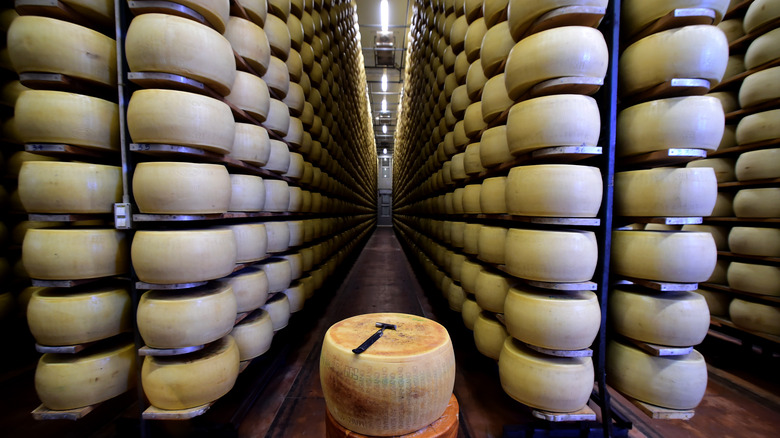The Difference Between Parmesan And Parmigiano Reggiano, According To Giada De Laurentiis
Giada De Laurentiis is one of the undisputed authorities on Italian and Italian-American cooking. De Laurentiis has had many shows over the years, including "Everyday Italian," "Giada's Weekend Getaways," "Giada In Italy," "Giada Entertains, "Giada at Home," and more, according to the chef's official website, Giada De Laurentiis. She also owns several booming Italian restaurants and has put out nine different cookbooks.
If someone were the person to go to in order to talk Italian cheeses, De Laurentiis would be it. And recently, she took to Instagram to settle an age-old question: What is the actual difference between parmesan cheese and Parmigiano Reggiano? They're both hard grating cheeses with distinct, sharp tastes that we all love to shower pizza, pasta, and pretty much anything else with. To the naked eye, they may seem indiscernible. But, as De Laurentiis recently revealed on Instagram, there are several between them.
They are two different cheeses
De Laurentiis broke it down in her recent Instagram video by saying that, basically, parmesan is a domestically produced cheese from domestic cows, whereas Parmigiano Reggiano is only made in Italy, specifically in the Reggiano region. De Laurentis goes on to say that cheeses labeled as parmesan are usually less expensive and are milder, less flavorful cheeses that work well when mixed into baked pasta dishes or mixed with other cheeses. Parmigiano Reggiano has a sharper flavor, and De Laurentiis suggests using it sparingly, like shaved over salads or to finish a dish, especially since Parmigiano Reggiano is more than double the price of parmesan.
De Laurentiis even suggests using the rind once the cheese is used up to flavor pasta sauce to ensure you get all the flavor out of the precious block. De Laurentiis says you can tell the difference based on the rind, and, as The Spruce Eats reports, Parmigiano Reggiano should be stamped on the rind indicating it was produced in either Parma, Mantua, Bologna, or Modena, and appropriately aged in accordance with Italian regulations. In contrast, the word parmesan isn't regulated and can be produced anywhere and aged for any amount of time.

